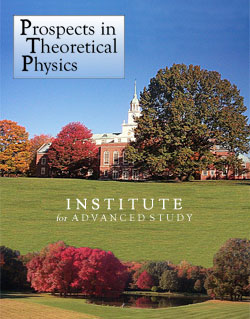

July 9 — 20, 2012
The deadline for applications was March 1, 2012
The 2012 Prospects in Theoretical Physics (PiTP) Program, "Computation and Biology," explored, for the first time, a range of topics at the interface of theoretical computer science, statistical physics and quantitative biology. This program was intended for graduate students and postdoctoral scholars in all three fields of computer science, theoretical physics and quantitative biology.
The Organizers for PiTP 2012 were: Bernard Chazelle (Princeton University), David Huse (Princeton University), and Stanislas Leibler (Institute for Advanced Study).
A list of general topics covered, and the lecturers who spoke on each topic, are noted below:
If you have questions regarding the 2012 PiTP program,
please contact Susan Higgins, (609) 734-8198; e-mail: shiggins@ias.edu
Prospects in Theoretical Physics is an intensive two-week summer program typically designed for graduate students and postdoctoral scholars considering a career in theoretical physics. First held by the School of Natural Sciences at the Institute for Advanced Study in the summer of 2002, the PiTP program is designed to provide lectures and informal sessions on the latest advances and open questions in various areas of theoretical physics.
One of the goals of the program is to help the physics community train the next generation of scholars in theoretical physics. A special effort is made to reach out to women and minorities, as well as to graduate students in small universities who typically do not have the same opportunities and access to leaders in the field as graduate students in large research institutions.
Prospects in Theoretical Physics builds on the strong relationship of the research groups at the Institute and Princeton University, and many faculty members from the physics departments at both institutions are actively involved in the program together with scientists from neighboring institutions.
The pilot program in the summer of 2002 was an introduction to string theory tailored to graduate students entering the field, where much attention was paid also to particle phenomenology and cosmology. PiTP 2003 was devoted to the problems and techniques at the interface of particle physics and cosmology. PiTP 2004 was a program for advanced graduate students in string theory, while PiTP 2005 was designed to provide an introduction to collider physics. The 2006 program covered recent advances in string theory that have found applications to gauge theories, integrable models, cosmology and mathematics, and the 2007 program - "The Standard Model and Beyond" - focused on particle physics phenomenology with special emphasis on model building. In 2008 the program - entitled "Strings and Phenomenology" - was designed for string theorists who wanted to learn about issues of compactification relevant to phenomenology and cosmology, and for phenomenologists who wanted to learn about strings and their applications to phenomenology. The 2009 program focused on "Computational Astrophysics" and was designed to assist young researchers in honing the numerical methods they employ in their own research and to learn about the techniques used in other areas of computational astrophysics. In 2010, "Aspects of Supersymmetry" was designed to give a coherent overview of the fundamental theoretical aspects of supersymmetry, emphasizing the common themes running throughout the subject, from the major advances made in the duality revolution of the 90's to the most exciting recent developments (integrability, M2/5 branes, N=2 theories and scattering amplitudes). An introduction to the formal aspects of SUSY breaking and softly broken SUSY at the weak scale was also given in parallel. The 2011 program, "Frontiers of Physics in Cosmology," explored the interphase between fundamental physics and cosmology, covering topics ranging from early universe cosmology to the late time acceleration of the cosmic expansion.
Institute for Advanced Study, Einstein Drive, Princeton, New Jersey 08540Email: pitp@ias.edu